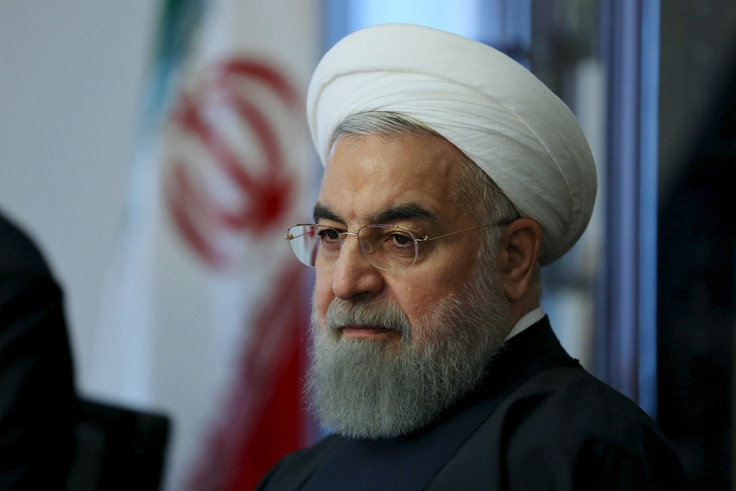After Iranian Elections, President Rouhani Targets Syria Changes And New Relationship With West

Amid sweeping gains for moderate candidates in last Friday's Iranian elections, Iran has reportedly decided to withdraw 2,500 of its hard-line Revolutionary Guard troops from the Syrian civil war. The military reduction will come as a blow to Russia and Syrian government forces, who will lose an ally, but a lower number of armed guards in Syria will be a major plus for the U.S.-led coalition fighting the Bashar Assad regime.
Rouhani, along with his moderate allies, won 15 of 16 Tehran seats in the 88-seat assembly, while moderates took all 30 Tehran parliamentary seats. This gives Rouhani a much stronger hand in what will likely be a bitter battle for power between himself and conservative elements in the country.
The withdrawal of troops from Syria may not be directly related to the election success, but it does draw attention to the unusual dynamic and division between Iranian President Hassan Rouhani and the country's anti-Western supreme leader, Ali Khamenei, who controls the highly conservative Revolutionary Guard and dictates Iranian foreign policy in places like Syria.
As Rouhani attempts to bring Iran out of international economic obscurity and improve relationships with the West, Khamenei is still suspicious of allowing foreign influence or investment into the country. Even though the election success gives Rouhani more power over the country's Assembly of Experts, which can name Khamenei's successor, it still might not be enough to replace him given the country’s dual political system, which favors hard-liners.
“While it’s significant that Rouhani and the centrists have reportedly gained control of the assembly, it doesn’t necessarily mean they are going to choose the next supreme leader,” said Ali Nader, a senior international policy analyst and Iran expert at RAND, a Washington-based think tank, who used another name for the reformists. “Even though the assembly is designed to choose a new supreme leader, it has historically not really made the final decision, so it's hard to know if this new power for the moderates will do that this time and if it will change what’s going on in Syria.”
Iran reformists win all Tehran seats https://t.co/yjfv8eIIcZ
— BBC News (World) (@BBCWorld) February 28, 2016
It’s not yet completely clear if Iran will follow through on its vow to withdraw its Revolutionary Guard troops from Syria as this is a promise made by the regime in the past. However, during testimony to Congress last week, Secretary of State John Kerry said that the Middle Eastern country had already withdrawn a “significant number” from the battlefield.
“The IRGC has actually pulled its troops back from Syria. Their presence is actually reduced in Syria,” Kerry told U.S. lawmakers. “That doesn’t mean that they’re still not engaged and active in the flow of weapons from Syria through Damascus to Lebanon.”
A State Department spokesperson told International Business Times that it had nothing to add to Kerry's comments from last week regarding the withdrawal of Iranian troops.
Rouhani's eagerness to develop better business relations with the West was clear when he addressed the United Nations last year in an attempt to have sanctions lifted by the EU and the U.S. in exchange for promises that Tehran would curtail its nuclear program. While Iran was able to achieve that, there were clear signs of tension between Rouhani’s moderate government and the conservative establishment led by Khamenei.
For instance, Rouhani has little to no control over the country’s Revolutionary Guard or foreign policy in places like Syria, Lebanon, Iraq and Afghanistan where its forces have been deployed and are at odds with Western powers. In Syria, for example, Tehran is aligned with authoritarian President Bashar Assad and Russia, which are both in opposition to U.S.-supported militant groups. And in the complicated theater of the Syrian civil war, all of these forces have a common enemy in the Islamic State group. The abduction of 10 U.S. sailors by the Revolutionary Guard in January was a perfect example of an act that benefited the anti-Western conservatives in Iran but hurt the moderates.
While Rouhani is also in favor of keeping Assad in power to fight terrorists, he has previously said he realizes that being in continual opposition to the West will not do anything to further his economic causes in Iran. And following his election victory, he is keen to change the antagonistic relationship that has developed with the West by using what he described as new powers.
“The competition is over. It's time to open a new chapter in Iran's economic development based on domestic abilities and international opportunities," the official IRNA news agency quoted him as saying. "The people showed their power once again and gave more credibility and strength to their elected government."
The ability to choose a new and possibly more moderate supreme leader is unlikely if history is any indication. When the previous supreme leader, Ruhollah Khomeini, died in 1989, he chose his own replacement and merely got the Assembly of Experts to rubber-stamp the decision, said RAND’s Nader, who added that it is too early to know exactly what Rouhani will gain from the victory.
However, Brenda Shaffer, a nonresident senior fellow at the Atlantic Council, a global think-tank based in Washington, said Rouhani’s position as a so-called moderate and someone who can effect change in the foreign policy set out by the supreme leader is somewhat a falsehood.
“We give too much relevance to the electoral game in [Iran]. The Parliament doesn’t have much influence, and I can’t see how this will affect the overall strategy in Syria,” she said. “The supreme leader is the supreme leader, and he will decide what Iran's policies overseas are.”
© Copyright IBTimes 2024. All rights reserved.






















